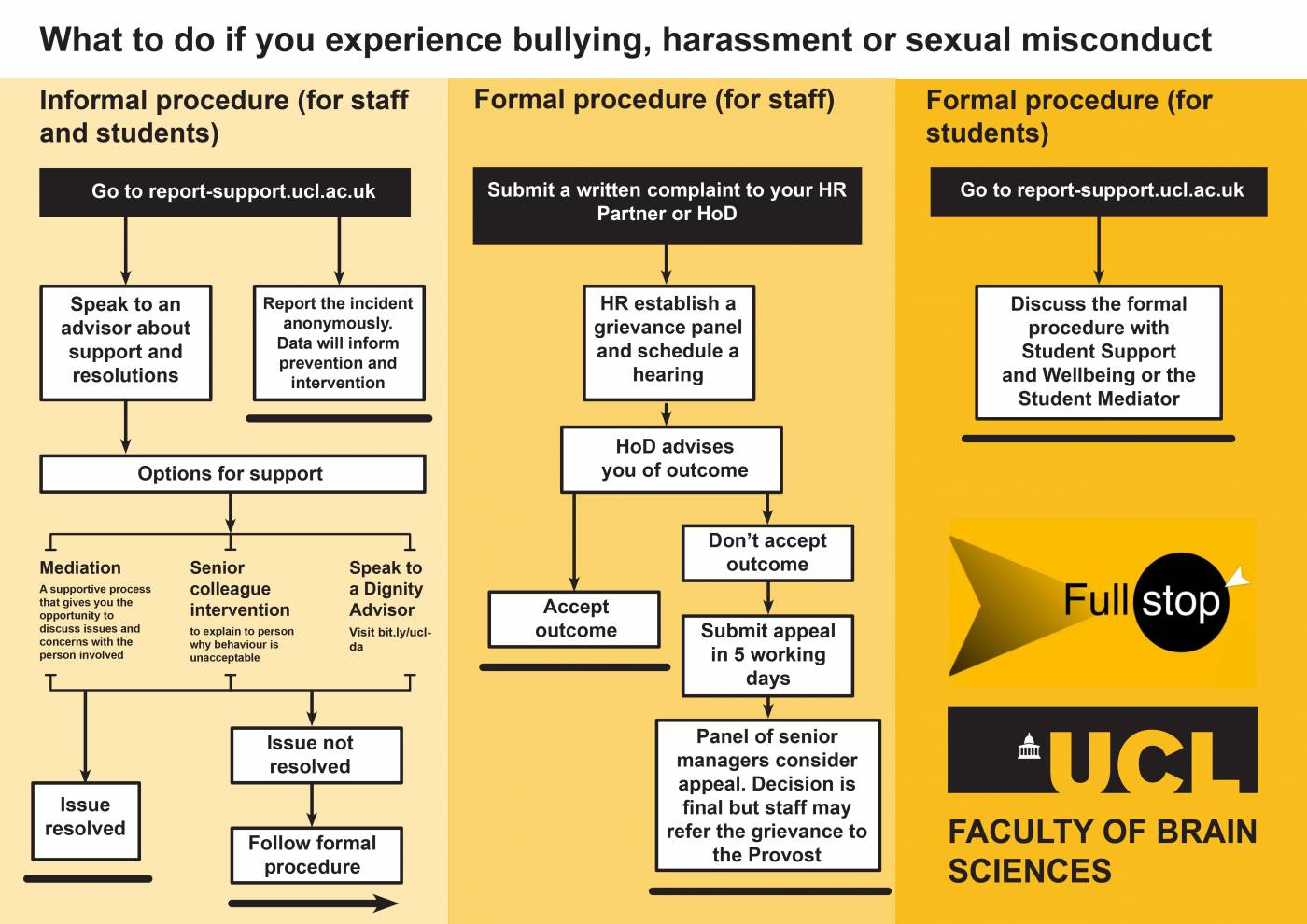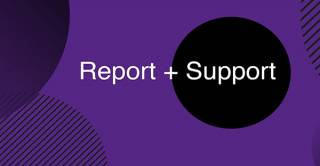The Institute fosters a positive cultural climate where all staff and students can flourish and be their authentic selves.
It is our belief that everyone has the right to study and work in a friendly and inclusive environment,free of prejudice, where they feel comfortable, respected, listened to, supported and valued. At UCL we have a zero-tolerance policy towards bullying, harassment, and sexual misconduct.
The IoN is fully committed to UCL's Dignity at Work statement and Staff and Student Harassment and Bullying Policy; all staff, students and visitors at the IoN can expect:
- a workplace free from bullying, intimidation, harassment or victimisation;
- to be treated with dignity, respect and courtesy;
- to experience no form of unlawful discrimination;
- to be valued for their skills and abilities.
Everyone is responsible for ensuring that they behave appropriately towards others, and for challenging or reporting unacceptable behaviour where it is witnessed. There are various mechanisms for challenging behaviour that contravenes the expectations laid out above.
The IoN is signed up to the Zero Tolerance to Sexual Harassment campaign
Where do you draw the line? has been delivered to staff and students, and all Group Leaders have participated in Taking the Lead training sessions.
Read the QS IoN Code of Conduct
QS IoN Code of Conduct poster
Challanging or reporting unacceptable behaviour
If unfortunately, you have experienced an encounter that made you feel unsafe or uncomfortable, you don’t need to go through this alone or unsupported. Access to information and dedicated sources of support is your right, is free of charge and is strictly confidential.
- Direct approach - challenging the behaviour informally
You may wish to directly approach the individual, either on your own or with support from a colleague, a Dignity at Work Advisor, IoN HR or UCL HR contact, a manager, or a trade union representative.
You should politely tell the person what it is about their behaviour that has upset you, and ask them to stop it immediately. It may be appropriate to advise them that if the behaviour continues a formal complaint might be made.
- Seek out a Dignity Advisor
The University has a network of trained Dignity Advisors who provide an informal, confidential information service to staff and students on issues relating to bullying, harassment, and sexual misconduct.
All Dignity Advisors are members of staff in a variety of roles across campus who volunteer to work to provide advice in addition to their day jobs. Dignity Advisors receive two full days of additional training on UCL policy on bullying, harassment, and sexual misconduct, related procedures, and relevant skills to listen to disclosures and sign-posting.
You may find more information about what Dignity Advisors can and cannot do in the UCL Dignity Advisors website. In the same website you may also find the full list of Dignity Advisors at UCL per Faculty. You may seek support from any of the UCL Dignity Advisors. Reasons that you may choose to seek support from a Dignity Advisor external to the IoN are that you might wish to talk to a Dignity Advisor who does not know the department or the people that manifest challenging behaviours.
The Dignity Advisors at the IoN are:
Martina Callaghan (m.callaghan@ucl.ac.uk)
Christine Chow (c.chow@ucl.ac.uk)
Faisel Farooq (f.farooq@ukdri.ucl.ac.uk)
Anna Foakes (a.foakes@ucl.ac.uk)
- Seek out one of our Wellbeing Champions
UCL Wellbeing Champions are responsible for supporting Wellbeing@UCL by promoting activities in local areas, encouraging colleagues to access relevant health and wellbeing opportunities, collating activity data, sharing best practice and stories of success.
They can also offer advise on what is the best rout to seek support if you are feeling under duress, anxious or stressed.
The IoN Wellbeing Champions are:
- Jacky Bauer (j.bauer@ucl.ac.uk)
- Linda Taib (l.taib@ucl.ac.uk)
- Beth Allen (beth.allen@ucl.ac.uk)
- Catherine Hills (catherine.hills@ucl.ac.uk)
- Reporting via the UCL Report + Support Portal
Report + Support is an online tool where staff and students can report issues of bullying, harassment, or sexual misconduct anonymously or request contact with an advisor to discuss their case. Report + Support is also home to supporting information for UCL students and staff on what to do if you are the victim of, or witness, bullying, harassment and sexual misconduct, as well as details of the UCL Full Stop campaign.
If you choose to report anonymously via the portal you will be asked a short series of questions regarding the incident that you would like to report. Following submission an administrator in the UCL Equality, Diversity and Inclusion team will first review the report to identify any risks that relate to UCL’s duty of care. If no immediate risk is identified, no further, direct action will be taken. The information kept will be for statistical reporting and to help identify trends for better prevention and intervention methods. If someone is named or identified within a report, the identifiable information will be removed and not stored.
You can also choose to contact an advisor via the portal. You will be asked a short series of questions and asked to select your preferred type of advisor. The administrators will assign a case to the requested advisor, which may include Human Resources staff, a Dignity Advisor, the Student Mediator or Student Support and Wellbeing staff. Each of the advisors are provided with a login and can only access cases that are assigned to them. The advisor receives an email notification that a case has been assigned to them – no identifiable information is provided within this email alert. The advisor then logs into Report + Support to access information provided using their personal login details and makes contact with you to arrange a meeting to discuss the case.
FAQs are available for the Report + Support portal, as is an informational video.
- Reporting via a manager informally
If you don't want to directly approach the individual you can raise your concerns with a manager at the IoN; this may be the individual's line manager/supervisor, your line manager/supervisor, or another senior colleague that you trust.
You will need to explain what happened, what action you would like taken (i.e. do you want your concerns to be acted on or just to be noted), and whether or not you want to report anonymously.
- Reporting through a confidential conversation with IoN HR informally
If you don't want to directly approach the individual you can also raise your concerns with a member of the IoN HR team. You can call or email us and arrange a confidential meeting outside of the building.
As above, you will need to explain what happened, what action you would like taken (i.e. do you want your concerns to be acted on or just to be noted), and whether or not you want to report anonymously.
We can also provide pastoral support, care and advice if you don't want to report an issue, but just want to talk to someone.
Contact our HR Manager, Laura Allum (l.allum@ucl.ac.uk).
- Reporting via formal UCL processes
Advice on how to make a formal complaint can be provided by the IoN HR team or your central HR Business Partner. It is expected that staff and students will raise an issue either informally or via Report + Support in the first instance.
Process for students:
- Formal complaints regarding unacceptable behaviour from another student(s) should be addressed to the Registrar.
- Formal complaints regarding unacceptable behaviour from staff should be addressed to the Director of HR.
- Formal complaints regarding both students and staff should be addressed to both the Registrar and Director of HR.
- More information on formal reporting is in the Student Harassment and Bullying Policy (https://www.ucl.ac.uk/students/policies/conduct/harassment-and-bullying-policy).
Process for staff:
- Formal complaints regarding unacceptable behaviour from a student should be addressed to the Registrar.
- Formal complaints regarding unacceptable behaviour from a staff members should be reported via the UCL Staff Grievance Policy (https://www.ucl.ac.uk/human-resources/ucl-staff-grievance-policy).
- Can I make an anonymous report/complaint?
When informally reporting your concerns you can ask to remain anonymous, but it is not possible to take anonymous formal action.
It may be difficult to realistically maintain anonymity if you would like action taken following informal reporting, as the details of the incident may make it clear that it was you that raised the issue. The feasibility of maintaining anonymity can be discussed when informally reporting to a manager or the IoN HR team.
If you do wish to remain fully anonymous please be aware that it may be difficult to effectively challenge the behaviour as there's no concrete example of the unacceptable behaviour to refer to when addressing it with the individual.
If you anonymously report via UCL's Report + Support portal an administrator in the UCL Equality, Diversity and Inclusion team will first review the report to identify any risks that relate to UCL’s duty of care. If no immediate risk is identified, no further, direct action will be taken. The information kept will be for statistical reporting and to help identify trends for better prevention and intervention methods. If someone is named or identified within a report, the identifiable information will be removed and not stored.
- Dealing with ongoing issues
It is recommended that you keep a record of any incidents of unacceptable behaviour, along with any attempts to address the issue, noting the dates, times, circumstances, and the names of any witnesses. This will be useful in the event that you need to make a formal complaint.
What will happen if I report unacceptable behaviour?
This depends on the action that you would like to take, the nature of the unacceptable behaviour, and whether or not you want to remain anonymous when the issue is addressed.
Usually the person that you report to will raise the issue with the individual's line manager (assuming this isn't who you have reported to), and their line manager will directly approach the individual and challenge their behaviour informally.
If you would like to remain anonymous, either SWC HR or their line manager will be notified, and if there is a pattern of behaviour it will be informally or formally dealt with depending on the nature of the reported behaviour.
Where the behaviour is very serious, or presents a health and safety risk, formal action may be taken.
What should you do if someone has a concern about your behaviour?
If somebody wants to raise a concern about your behaviour with you, or report to you that they've received a complaint, don't ignore it or disregard it. A complaint doesn't normally have to be serious, and if you can take on board the concerns raised and modify your behaviour accordingly, it's likely that the issue will be resolved with an apology and an assurance that you will avoid behaving in the upsetting way again.
It can be helpful to meet and talk through the issue; if you meet you should:
- listen to the points that are made without interrupting or getting defensive;
- allow the complainant to explain the way they feel;
- seek clarification on what aspects of your behaviour are felt to be unacceptable;
- discuss how you might work together more effectively;
- try to remain calm and avoid escalating what is a difficult situation for both of you;
- apologise, if appropriate.
It may be a shock to be told about the effect of your behaviour, so if you need to, ask for a break or time to consider your response.
Formal complaints
If someone has made a formal complaint about your behaviour, this will be dealt with as per the appropriate policy, and typically would involve an investigation into the allegations. Guidance on this can be provided by IoN HR or your central HR Business Partner.
Sources of support and training
- UCL-Guidance-Managers-difficult-conversations
- Report + Support website - guidance is available online here, along with the Report + Support privacy notice and information on UCL's Full Stop campaign.
- UCL Online Harassment Support Toolkit
- FAQs are available for the Report + Support portal, as is an informational video.
- The IoN HR team are always available to have a confidential discussion or provide advice and guidance; reach out to IoN HR Manager, Laura Allum (l.allum@ucl.ac.uk).or in person in the 2nd floor HR office at 23 Queen Square. Alternatively you can contact your UCL Business Partnering Team contact.
- Additional support and advice is available from the Employee Assistance Programme, Mediation service, Trade Union Representatives and there are workshops on the UCL Learning and Development website that may be helpful, such as Resolving Conflict, Resilience and Resourcefulness, and Courageous Conversations.
UCL Student Contacts and Resources:
- Research Department Graduate Tutors
- Students Union UCL Rights & Advice Centre
- UCL Student and Registry Services
- Student Mediator (Dr Ruth Siddall)
- Student Support and well-being website
- Student Support and Wellbeing: who we are and what we do
- Here to Support You: A guide to UCL Student Support and Wellbeing services
- Countdown to UCL, guides and Welcome to UCL app
- Student Support and Wellbeing YouTube channel
- UCL-wide survey of student mental health and wellbeing
 Close
Close




